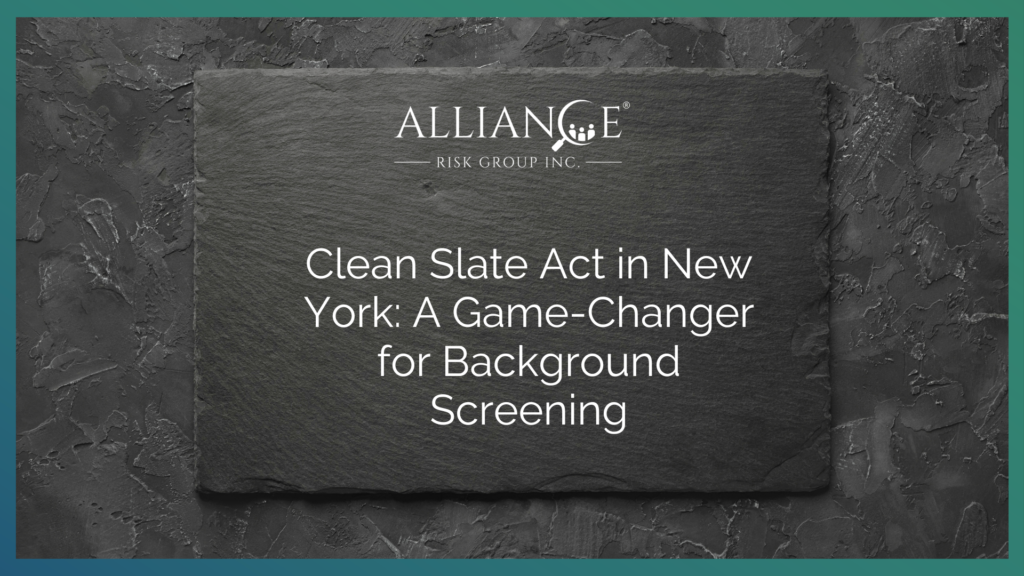Governor Kathy Hochul recently signed the NY Clean Slate Act.
This legislation has far-reaching implications for individuals with criminal records seeking a fresh start and for the employers that may hire them. The Clean Slate Act aims to seal certain criminal records, providing a pathway for affected individuals to pursue employment, housing, and educational opportunities, ultimately facilitating their reintegration into society. From the perspective of Alliance Risk Group,Inc. this legislation introduces a new dynamic to the landscape of background checks. Employers, in most industries, will no longer be able to see past convictions; the record will be removed before the background report is pulled. Additionally, the Clean Slate Act initiative varies state to state, so it’s crucial HR professionals research state clean slate legislation while hiring individuals from or in another state.
About the Clean Slate Act
The Clean Slate Act, as signed by Governor Hochul, outlines a systematic approach to record sealing based on the severity of the convictions. Misdemeanor convictions become eligible for sealing after three years, while certain felony convictions can be sealed after eight years following release from incarceration. In the state of NY, the law is set to become effective in November of 2024, providing a transition period for implementation.
The motivation of the Clean Slate Act to create a more inclusive job market and allow people who have been charged with a crime and served their time a fresh start. By allowing individuals with past convictions to rebuild their lives and pursue stable employment, the Act aligns with the broader goals of societal reintegration and reducing recidivism. For employers, this could mean a more diverse pool of qualified candidates, promoting inclusivity and giving individuals a genuine chance at rehabilitation as well as an opportunity to tap into a talent pool that may have been overlooked in the past due to the stigma associated with criminal records. However, it creates murky waters that HR professionals must wade through when hiring.
Here’s What You Need to Know about the Clean Slate Act
Eligibility for Access:
Be aware that certain entities, including courts, prosecutors, law enforcement officers, and those conducting fingerprint-based background checks for specific roles, will continue to access sealed records.
Recognition of Exemptions:
Note the exemptions outlined in the law, such as the preservation of active protection orders, DNA database submissions, and Department of Motor Vehicles records, which remain unaffected.
Addressing Potential Candidate Confusion:
Anticipate that candidates might be uncertain about sealed records, leading to questions or statements during background check discussions. Clarify any confusion and ensure transparency.
Navigating the Transition Period:
Understand that the state Office of Court Administration has up to three years to implement processes for identifying and sealing eligible conviction records. During this transition, stay informed about developments and adapt your hiring processes accordingly to ensure fair hiring practices.
Consistent Handling of Convictions:
Develop a consistent approach to handling potentially disqualifying convictions revealed in background checks. Ensure compliance with various laws impacting the hiring process, including any state and local requirements, consulting legal counsel when needed.
Maintaining Compliance with Job-Related Analysis:
Recognize that the new law doesn’t alter an employer’s obligation to conduct a job-related analysis before adverse action based on criminal convictions. Continue assessing factors such as severity, nature of the crime, rehabilitation efforts, and other considerations outlined in New York’s Article 23-A.
The Society for Human Resource Management offers great advice on balancing old and new practices: “Factors to consider in a job-related analysis include assessing the severity of the crime, the nature of the crime, whether the offense affects the applicant’s ability to perform the specific job duties, the person’s age at the time of the offense, the time elapsed since the offense occurred, rehabilitation efforts, bondability, possession of a certificate of relief from disabilities, New York’s policy to encourage employers to hire applicants with prior convictions, and the interests of the employer to protect its property, staff, and customers.”
As the Clean Slate Act unfolds over the coming years, Alliance Risk Group remains committed to navigating these changes and providing comprehensive background screening solutions that protect our customers and allow for the best hire possible.
Contact us today if you want to partner in navigating this legal landscape.
Read more about the Clean Slate Act HERE

